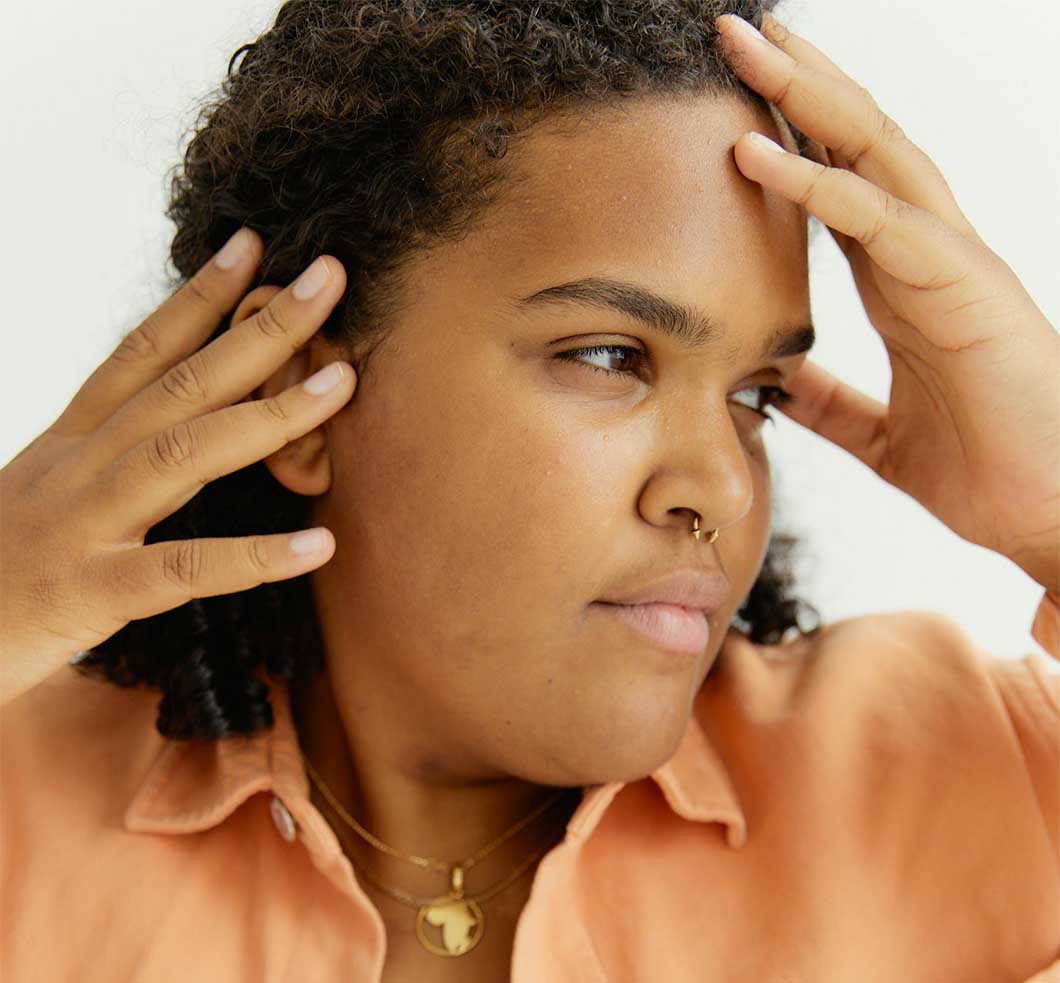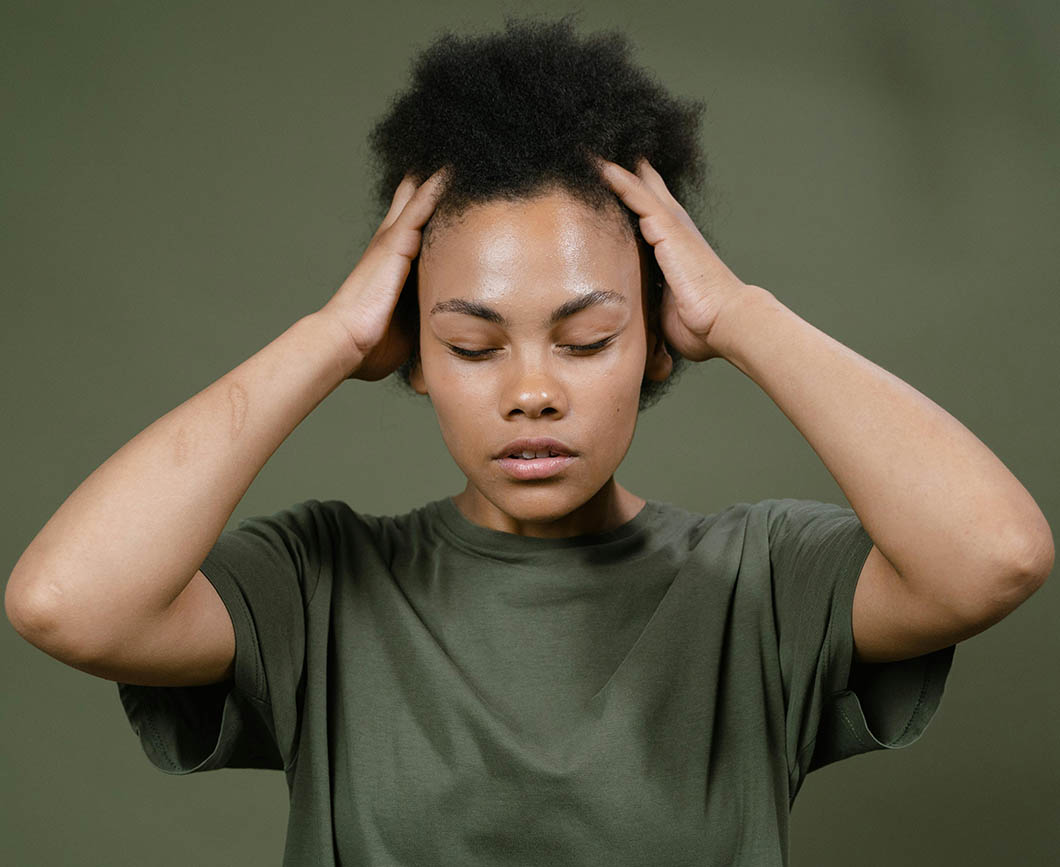Sensitive Scalp: Causes & Treatment
Are you struggling with a sensitive scalp, that causes you discomfort and gets in the way of your hair goals.
Then read on to find out more about this scalp condition, and how you can manage it at home..
Let’s dive in.
*Pssst, for a comprehensive understanding of scalp care, read up on Healthy Hair & Your Scalp.
1. What is a Sensitive Scalp?
A sensitive scalp is characterised by sensitive skin on your scalp.
This sensitivity can be in one spot or in many spots all over your scalp.
2. What causes a Sensitive Scalp?
Many factors can contribute to a sensitive scalp. These include:
• Hair Loss: Certain hair loss conditions, such as alopecia areata, centrifugal cicatricial alopecia (CCCA), and telogen effluvium, often come with scalp sensitivity.
• Skin Conditions: Common skin ailments like eczema, psoriasis, and dandruff, along with head lice, rashes, and more serious underlying conditions like skin cancer, can all make your scalp tender.
• Allergies: An allergic reaction can irritate the scalp.
• Infections: Both skin and hair follicle infections can cause sensitivity.
• Styling Choices: Tight hairstyles, headbands, and helmets can strain the scalp.
• Heat & Tools: Overuse of styling tools like curlers, hair dryers, flat irons, and even hairpins can lead to irritation.
• Chemical Exposure: Incorrect or frequent use of harsh chemicals, such as relaxers and hair dyes, can significantly impact scalp health.
• Stress: Emotional or psychological stress can often manifest as scalp sensitivity.
• Sun Damage: Extended exposure to the sun can result in a sunburned, sensitive scalp.
Are you struggling with an Itchy scalp? Read up on our Home Remedies for A Dry Itchy Scalp.
3. Symptoms of a Sensitive Scalp
Having a sensitive scalp can manifest in several ways. You might experience one or more of these symptoms:
• Itching
• Inflammation
• Pain
• Numbness
• Irritation
• Tingling
• Throbbing
Catch up on all things related to an Oily Scalp: Why You Have It & How to Treat It.
4. How to treat a Sensitive Scalp
Here’s how to treat a sensitive scalp.
1. Good Hair Hygiene
• Reduce or stop using hair curlers, pins, flat irons, and hair dryers.
• Avoid heat styling as much as possible, or use the lowest heat setting.
2. Let Your Hair Down
• Avoid tight hairstyles like ponytails, braids, and cornrows.
• Wear your hair loose to allow your scalp to breathe.
• Refrain from wearing headbands, helmets, and barrettes that put pressure on your scalp.
3. Scalp-Friendly Hair Routine
• Gently massage your scalp with your fingertips.
• If your scalp is too sensitive to touch, use hot or cold packs for relief.
4. Use Specific Hair Hygiene for a Sensitive Scalp
• Wash your hair with lukewarm to cool water.
• Use gentle hair products designed for sensitive scalps.
• Do not vigorously rub your scalp; instead, dab it dry with a soft towel or air dry.
5. See a Medical Professional
• Seek a medical diagnosis to understand the cause of your sensitive scalp.
• A healthcare professional may prescribe medicated creams, ointments, topical shampoos, rinses, or conditioners.
Prevention is Better than Cure
Once you have treated this condition, take the following steps to prevent recurrence: –
🌺 Gentle Hairstyling
Avoid hairstyles that put prolonged tension on your scalp. This includes tight braids, dreadlocks, weaves, and even very tight ponytails or buns. Opt for looser styles and vary your hairstyles frequently to distribute any pressure.
🌺 Mindful Product Use
Limit the use of hair products with harsh chemicals. Ingredients like sulfates, parabens, and strong alcohols can strip your scalp of its natural oils, leading to dryness, irritation, and even allergic reactions. Look for products that are sulphate-free, paraben-free, and designed for sensitive scalps.
🌺 Sun Protection for Your Scalp
Just like your skin, your scalp can be irritated / damaged by excessive sun exposure. Wearing a sun hat or using a hair product with SPF when you’re going to be outdoors for extended periods is highly recommended.
🌺 Stress Management
There’s a well-documented link between stress and hair health. Proactively managing lifestyle stress through techniques like meditation, yoga, regular exercise, or seeking professional support can significantly benefit your overall well-being and, consequently, your hair and scalp health.
By following these practices, you’re taking excellent steps toward maintaining a healthy scalp and promoting strong, vibrant hair.
Do you suffer from a sensitive scalp? Have you gotten any relief from using any of these methods? Do you have any advice for those suffering from this condition? Sound off in the comments and let us know what you think.
And until the next time, gorgeous ladies, happy naturaling!



